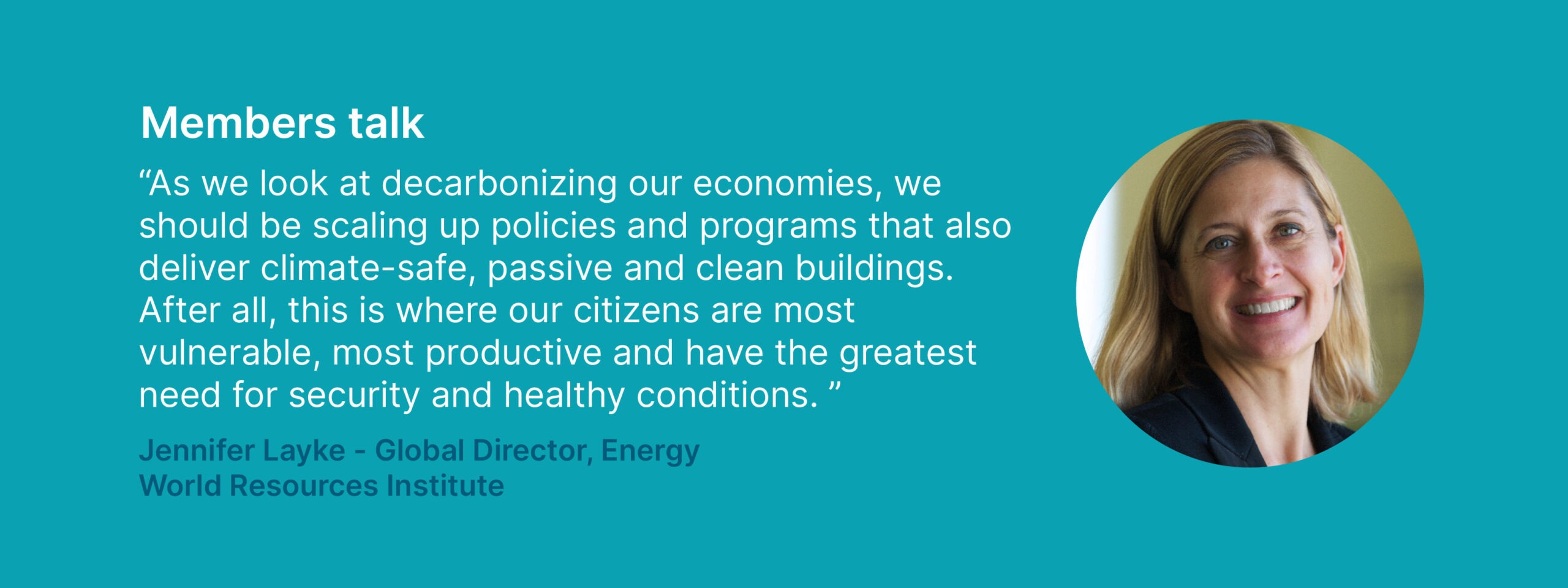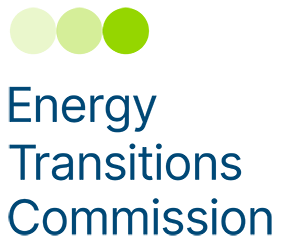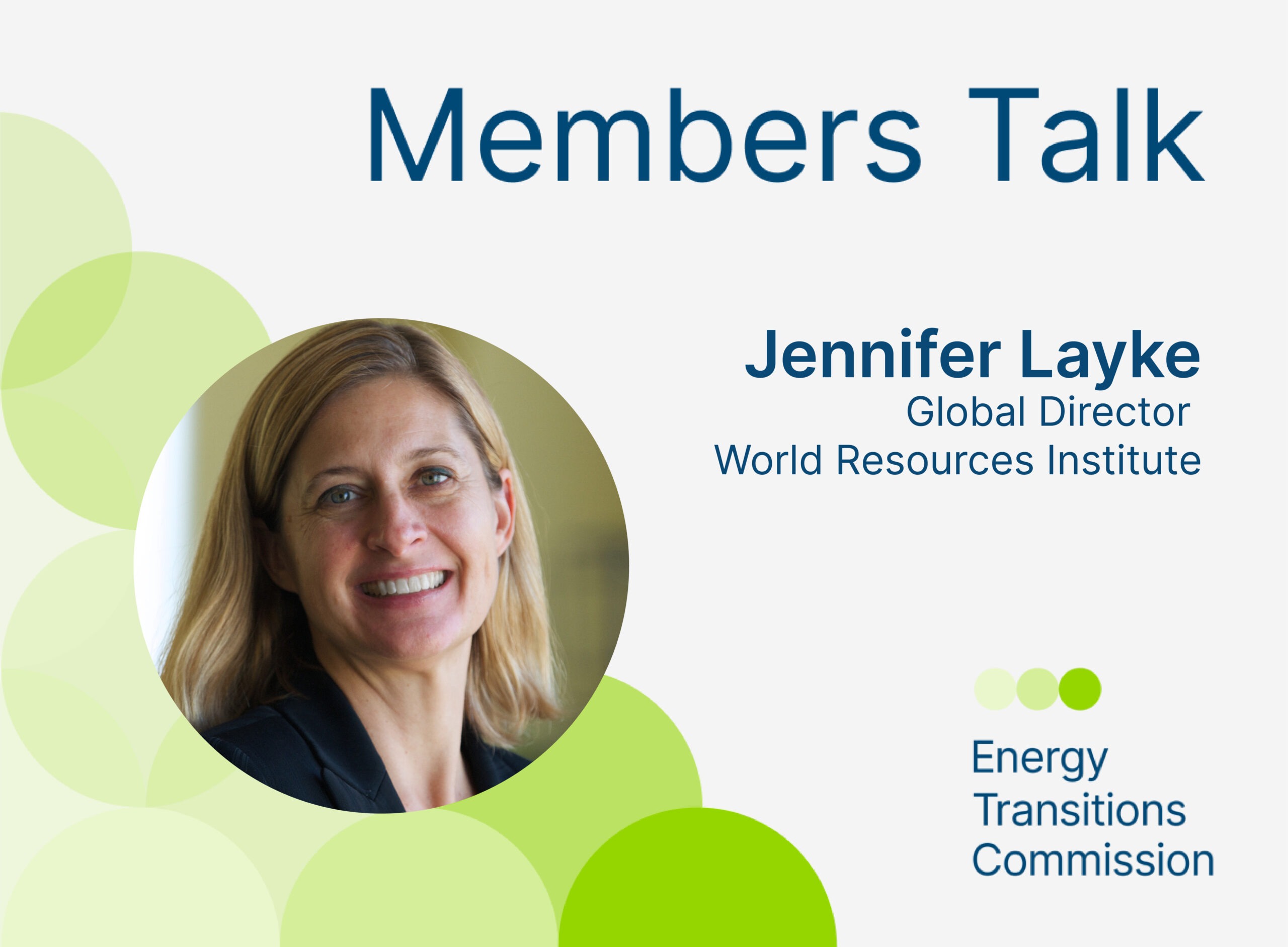Get to know our members and what being part of the ETC means to them. We are pleased to share an exclusive interview with Jennifer Layke, Global Director at the World Resources Institute.

What drew your organisation to join the ETC?
When World Resources Institute (WRI) joined the ETC back in 2017, the landscape of evidence and analysis for the energy transition was not as well-formed as it is today. Organizations and experts were focusing on single technologies – price points, delivery approaches and financing vehicles. The ETC brought a new approach, going beyond simple analysis and technical requirements of the transition and shifting the discussion to focus on economic transition. This “techo-economic” analysis offered something critical: a review of assumptions around what industry, policymakers and analysts saw as the drivers and barriers to shifting to a clean energy economy. WRI joined because we saw the ETC’s contribution as providing an essential grounded, techno-economic, industry-reviewed analysis and system-level view.
What do you see as the ETC’s most impactful achievement since you’ve been a Commissioner/Representative?
It’s hard to single out just one! I’ll offer two: I am a huge fan of the work on the pathways for decarbonizing the industrial sector. The Making Mission Possible report offered a view of the decarbonization agenda from outside the power system, but addressing the questions: “What will the decarbonization of our economies mean to the power sector? And what will it take to electrify?” And the partnership with WEF allowed ETC to go even further.
I think that ETC isn’t afraid of asking the hard questions, as we did in the Bioresources within a Net-Zero Emissions Economy report. The report explores how land and bioresources should enter the energy economy–as opposed to being used for food crops, ecosystem services or carbon sequestration. ETC’s analysis challenged prevailing estimates of the potential role for bioresources in energy by recognizing that most analysis does not account for the opportunity cost of land use. The report also adds evidence to the growing debate about considerations of the first, best use of land, and revises downward the viable limits of truly low-carbon, high-value, sustainable bioenergy within the constraints of land use. ETC’s approach–using evidence and analysis to challenge prevailing thinking–is definitely where the greatest impact can be made.
What do you see as the biggest obstacle on the journey to net-zero?
I believe that social acceptance of the transition to a decarbonized economy is our biggest obstacle. Humans and institutions like to replicate the pathways we know– it’s less risky. So we know there is conflict: the old ways of doing things versus the new ways. And we know that not all workers, not all companies and not all communities experience benefits. Some have experienced decades of feeling left behind and invisible, and wonder why any set of policies and technologies should give them any greater confidence that economic prosperity and safety will come to them. Farmers, workers and even entire incumbent industries will experience disruption. We need to manage for that. The question is: How do we address political economy issues, economic disruptions and fear of change?
What are the key milestones you see on the road to net-zero, and why?
There are a few areas that represent immediate opportunities to drive major progress. I think the ground transportation sector will prove to be one of the areas we’ll see a lot of uptake of electrification–and with increasingly renewables-based generation. The merging of the power/transport and power/buildings spaces is also really exciting. I also think we will need to grapple with how to fund the transition from fossil heating, which can include interventions such as designing programs for small and medium industries to move from diesel and fossil fuels to electric heat pumps for low-temperature heat.
What is the one necessary change you feel most personally passionate about in the transition journey?
Aside from leading WRI’s Global Energy team, I chair the World Green Building Council. There is an amazing movement to decarbonize buildings and it needs more attention and resources. I have seen many governments and philanthropies shy away from buildings because the real estate and construction sectors are dispersed and there are so many discrete actors. It starts with strong building standards effectively delivered and enforced. Also, as we look at decarbonizing our economies, we should be scaling up policies and programs that also deliver climate-safe, passive and clean buildings. After all, this is where our citizens are most vulnerable, most productive and have the greatest need for security and healthy conditions. I’m so pleased that ETC will be examining heating and cooling needs, with a focus on buildings. It’s one of my greatest wishes–that we deliver better buildings!



